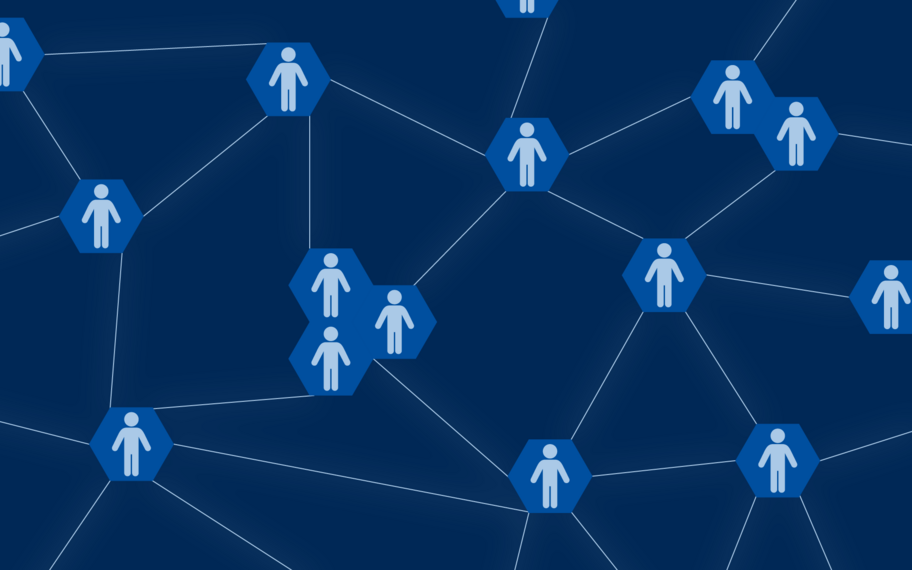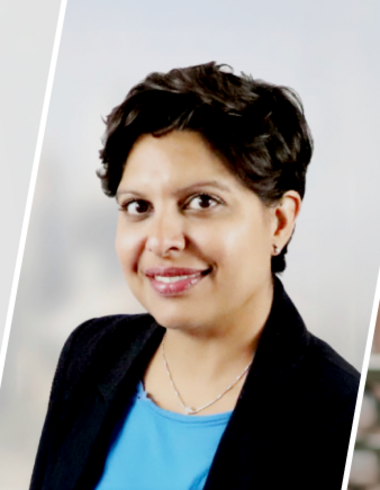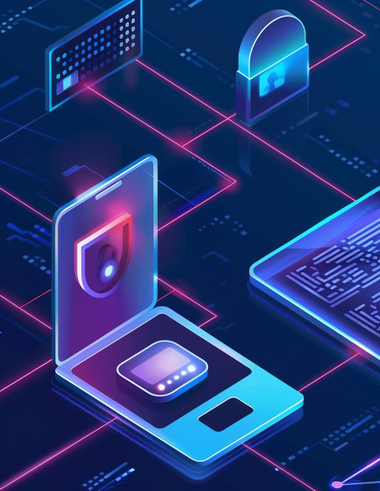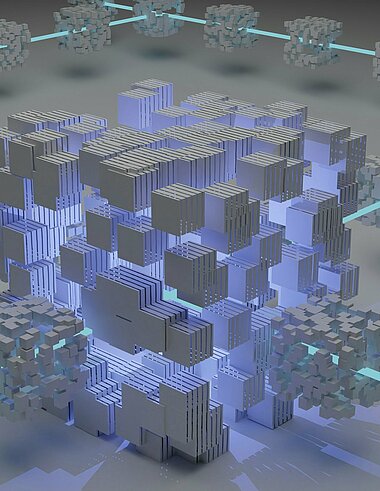Decentralized autonomous organizations are becoming increasingly popular, but they have legal hurdles to overcome.
When the cryptocurrency DASH called itself a "Decentralized Autonomous Organization" (DAO) in 2014, the term was new to many. The breakthrough came a year later: Christoph and Simon Jentzsch developed "The DAO", the first DAO on the Ethereum network. The purpose of the concept was to create a digital organizational infrastructure in which people and organizations can work together in a more democratic and decentralized way without a hierarchically rigid decision-making structure. This aspiration represents an intention that still shapes many DAOs today.
What is a DAO?
"A DAO (Decentralized Autonomous Organization) is a group of people with similar goals who come together under a smart contract blockchain infrastructure to enforce common rules." That's how the whitepaper published in March by the Federal Blockchain DAO Working Group summarizes the "lowest common denominator" of the more than 11,000 organizations now listed by the DAO analytics service "DeepDAO."
Establishing a uniform basic understanding of DAOs is one of the priorities of the JSC, which has been dealing with the topic of DAOs at the federal level since mid-2022. "Currently, there are many different views about DAOs, and the name DAO is often used, although it is not actually a DAO in the technical sense," explains Dr. Robert Mueller from the DAO JSC.
Roughly speaking, the DAO is a form of organization that takes advantage of decentralized systems not only for the technological level, but also for the organizational level. Thus, DAOs can also be understood as a digital version of the cooperative model: Ideally, there is no hierarchical management, but members own "tokenized shares" in the organization and make decisions in proportion to their investment or token share in the collective. For example, members can vote on whether to use DAO funds (usually cryptocurrencies) to fund a project or pay partner companies to manufacture a product. In many cases, shareholders can put forward proposals and invite votes on their implementation.
The organization and implementation of these decisions are recorded on a blockchain - so far mostly via Ethereum - and carried out by so-called smart contracts. This refers to programs that function according to an "if-then" scheme. These rules guarantee the execution of the previously defined decision patterns. However, there is also a non-blockchain part, the so-called off-chain area. In addition, the fact that "the underlying off-chain logics or data are usually not visible is worth noting. This is especially important to keep in mind when investing in a DAO," the white paper from the DAO Working Group of the Federal Block notes. For example, according to Müller, preliminary votes can already take place in forums and are therefore not recorded on a blockchain (i.e., "off-chain").
DAOs in all shades
"The result shows that there are very many shades of DAOs, all of which are based on the principles of decentralization and autonomy, but which in reality are very different from one another and also differ greatly in their purposes and goals," the white paper continues.
The variety of possible applications is certainly one reason for the "exponential growth" of DAOs, according to experts. Whether the majority of companies in all sectors are using DAOs, as proponents claim, is not absolutely necessary for Müller from the DAO working group. "But when it comes to IoT and micropayments and their orchestration, this form of organization is probably unavoidable, because it can independently trigger operations using smart contracts and oracles (note: agents that can verify events and external data from the real world and make them available for smart contracts) in the micropayment sector," says his colleague from AG DAO, Jan-Gero Alexander Hannemann, with conviction.
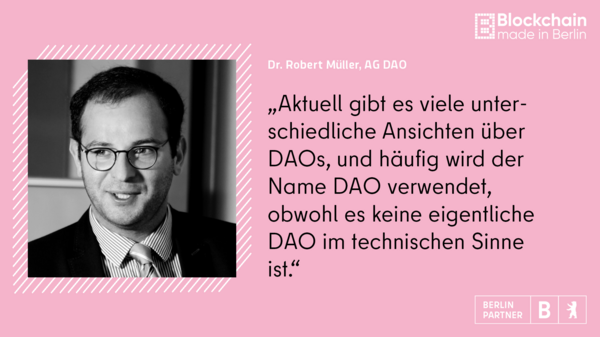
Dr. Nina-Luisa Siedler, partner as well as lawyer at the Berlin law firm "Möhrle Happ Luther" and expert for blockchain/DLT projects, also currently perceives a great interest in this new form of cooperation: "While DAOs have long been considered a gimmick for technology enthusiasts, larger companies are now also investigating possible areas of application," says the expert. The entertainment and gaming sector in particular is predestined for the new form of organization, she says. "Here, it's not necessarily about creating real, digital company shares, but under certain circumstances simply about the participation of fans or certain customer:groups in individual decisions or in-game processes." These are often easy to implement, even under the current legal framework.
Germany's legal challenges
This is not always the case in the area of DAOs. On the contrary: With regard to the legal framework, many points are unresolved - first and foremost the question of the appropriate legal form: "In which corporate form does decentralized decision-making receive the best legal framework? What types of company are there anyway? Closely related to this is the question of the limited liability of the founders, shareholders and management (if one can speak of such a liability). And finally, tax law always plays a role in the decision-making process," says Siedler, who knows the challenges from practical experience.
Under German law, a DAO can take the legal form of either a civil law partnership ("GbR" or BGB-Gesellschaft) or an unincorporated association. The latter is usually chosen because: "As a rule, no team that starts a DAO project wants the GbR," Siedler explains, because "its partners have unlimited and personal liability, which is a rather uncomfortable idea in a field that is still so young in terms of technology. The GbR is really only suitable for cases in which the participants know each other well and can rely on each other absolutely. That is not the case with a DAO that is ultimately designed for an unlimited and anonymous circle of participants." Therefore, in the context of DAOs, the GbR would only occur as an "unintentional chance company" that - in the absence of the choice of another legal form - could arise unintentionally.
Since this situation is not satisfactory for the growing ecosystem, various approaches are being discussed in legal science. These include, for example, the cooperative or a separate DAO limited liability company. "The various approaches try to clothe the (technical) decision-making of the DAO in one of the already existing legal frameworks," says Sieder, "unfortunately, this is mandatory because there is the so-called 'numerus clausus' of corporate law types: One cannot invent a new form, but can only choose between the forms provided by law. The legislator could, however, draw up a new form that is more suitable for the DAO."
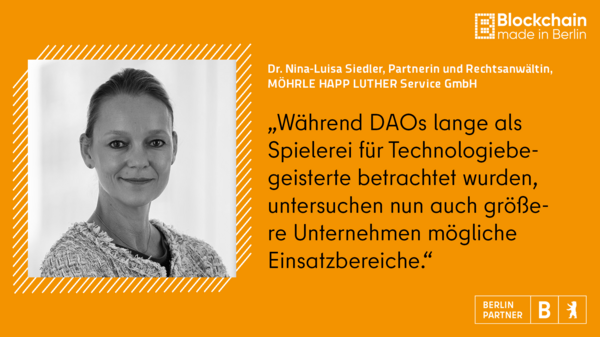
Solutions around the world
This is exactly what has already happened in various countries around the world. The white paper of the Working Group DAO of the Federal Block gives an overview of the creative approaches to deal with the legal situation of the new organizational form:
USA - Limited Liability Companies
1) Wyoming:
In the Wyoming solution mentioned by Siedler, the formation of DAO LLCs (Limited Liability Company) is allowed, which incidentally are also recognized in Germany: In this case, the management is in the hands of the participants:inside or the smart contract. The articles of association must contain a disclaimer as to how rights within this organizational form differ significantly from rights in conventional LLCs. However, the white paper says, the DAO LLC has not proven itself in practice and has created more problems than solutions. For example, there would be ambiguities in the power of representation.
2) Blockchain-Based Limited Liability Company (BBLLC) Vermont: a prerequisite for a BBLLC is a provision of the DAO on the Ethereum Blockchain and registration in Vermont. By linking to the BBLLC, the DAO has an official legal status.
3) Delaware LLC: Either a Legal DAO or LLAC (Limited Liability Autonomous Company) can be established, which also does not require a Board of Directors.
"The Anglo-American LLC corresponds to the GmbH in Germany," explains Nina-Luisa Siedler and critically objects to the legal form that "directly tokenized GmbH shares [...] are currently not legally representable due to conflicting legal formal requirements. Even if the formal requirements did not stand in the way of tokenization, the result would still be a centralized vehicle with central management. In my view, what is critical in structuring a DAO is the relationship between the technical decision-making and possibly profit-sharing mechanism and the embodiment of the DAO as some sort of legally recognized person."
However, it is not only in the U.S., but also in small states in the Pacific that there are favoring attempts for DAOs. This is often done specifically to attract blockchain industries and innovation.
Marshall Islands
The Marshall Islands Non-Profit LLC is a legal entity where bylaws and membership are recorded on a blockchain. No liability is incurred by members.
Cayman Islands
The Foundation Company creates an ownerless legal entity with limited liability. It features flexible governance based largely on voting via tokens. In addition, advisory board members can be appointed. There is no need to keep a register of beneficiaries with their legal names. The beneficiaries are divided into classes of persons and listed, for example, as "token holders" or "node operators". This variant is suitable for both private asset structures and commercial companies.
Europe
Estonia's pioneering role in the digitization of the state and digital administration is also evident in the area of DAOs. Although there is not (yet) a separate legal form specifically for decentralized organizations. However, the limited liability company and the non-profit association can be used to manage DAOs. An advantage is that, since 2020, shareholders and partners of all legal entities have been able to make all decisions digitally. In addition, they are entitled to pass resolutions without convening general meetings. The e-Residency offer also enables foreign entrepreneurs to establish and operate legal entities in Estonia online without ever having traveled to the country.
The Info Beat platform summarizes the benefits of establishing a DAO in Estonia as follows:
- Greater inclusivity and responsiveness for members. Every shareholder:in has an equal say in how the company is run.
- Little to no room for human error.
- Legal advantages of a regular limited liability company, including legal protection
- More transparency and security
The Berlin-based DAO METAWALLS, whose mission is to promote street art around the world, has already taken advantage of precisely these benefits and established its organization in Estonia.
Risks of Offshore and USA Foundations
Like the initiators of METAWALLS, many DAOs in this country are considering an offshore or USA solution when founding their form of organization, given these opportunities abroad - and the lack of alternatives in Germany. According to Nina-Luisa Siedler, this is a dangerous approach: "Both in terms of company law and taxation, it is difficult to run a company completely from abroad," she points out. This "regularly leads, sooner or later, to an (unintended) relocation of the corporate and/or tax domicile, with far-reaching consequences for the personal liability of those involved. Unfortunately, advisor:s of offshore solutions rarely talk about this." The employment of a local manager, who leads the business on instruction of actual founder:inside, is only a sham solution, he said. "In this respect, every German interested in an offshore or USA solution should honestly ask himself/herself who is to manage the vehicle from where and how profits are to flow to those who are to profit from the vehicle," she advises. Only then can the question be answered whether the foreign vehicle makes economic sense.
Discussion in Germany
What may be advantageous for DAOs in individual cases could have dire consequences for Germany as a business location: The DAO-JSC of the Federal Block is "of the opinion that a separate legal form for DAOs would have to be created, because otherwise Germany could lose the DAO ecosystem," Hannemann points out. "Moreover, in the U.S. and some other countries, this is already a reality."
In this country, on the other hand, according to Nina-Luisa Siedler, people are a long way from establishing a separate legal form for DAOs: "With the planned Future Financing Act, the introduction of an electronic share is just being considered," she says, adding, "However, further simplifications to regulate company formation are quite conceivable." Just as parts of the U.S. have already shown.
Creating such a legally secure framework would not only ensure adequate consumer and creditor protection, experts agree. It would be an important next step in promoting and establishing DAOs and the blockchain industry in Germany.
Sources:
https://en.wikipedia.org/wiki/The_DAO_(organization) (23.4.2023)
Whitepaper der Working Group DAO des Bundesblocks: https://bundesblock.de/wp-content/uploads/2023/03/DAO-AG-Veroeffentlichung.pdf (23.4.2023)
DAO Analytic Service DeepDAO: https://deepdao.io/organizations (23.4.2023)
https://www.e-resident.gov.ee/blog/posts/daos-in-estonia/ (9.5.2023)
https://estoniadao.org/ (9.5.2023)
https://infobeat.com/why-open-a-dao-company-in-estonia-full-information-for-registration/ (9.5.2023)

